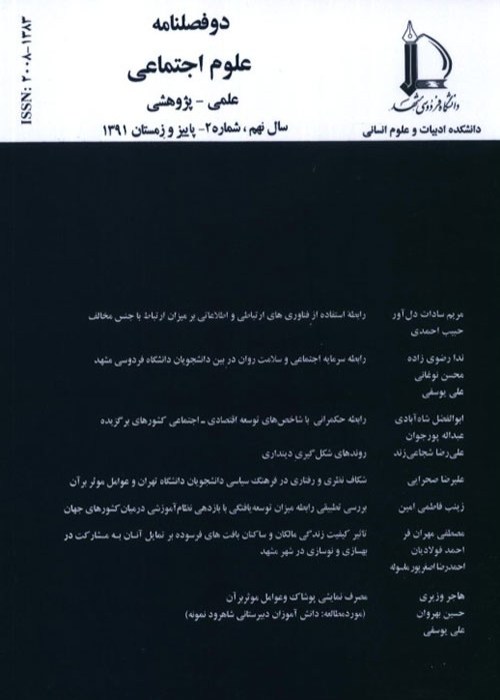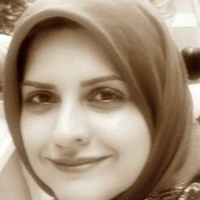Looking For Participation: Understanding Educational Donor's Experience (A Case Study of Mashhad, Iran)
Author(s):
Abstract:
Introduction
Social participation is known as an active form of participation in the creation of the social life. Financial participation is a type of social participation. It seems finding financial sources is the most serious concern for educational organizations in many countries including Iran. So the educational system often is interested in volunteer citizen's financial participation in building, developing and equipping educational spaces. In modern Iran there is a relatively successful history of several decades of Iranian donor's participation in financing physical space of education.This paper aims to understand the meaning of participation in the participant's viewpoint. The second aim is the exploration of educational donor's expectation of participation mechanisms in school construction, and retaining or upgrading participation level.
Theoretical framework: In symbolic interactionism paradigm in social science, values and meanings of participatory action for social actors has essential importance. Socio-psychological readiness defined by meaning system and values and norms in actor's mind form actor's intention for participation.
Methodology
Adopting qualitative approach, 28 semi-structured interviews were conducted to catch and reconstruct the perception and expectation of donors. Participants were educational donors of Khorasan Razavi province1. According to the definition "Educational donors" were people who donate money or their property (including building or land), without expectation to returning their capital in any form. This donation had been done under the rules of an official contract with "Schools Renovation, Development and Outfitting Organization(SRDOO) of Khorasan Razavi province to be expended in developing educational spaces. Theoretical sampling performed and it continued until data saturation was reached. Six women and 22 men participated in the study. They aged between 43 and 82. Interviews were recorded and converted to text. Then thematic analysis was conducted.Results
Results showed that donors had a spiritual and social perception of their action as philanthropists. Spiritual perception themes include everlasting good action, God-satisfaction, blessing, attaining peace and delight, preferring spiritual values to materialist values, and necessity of benevolence. These spiritual perceptions mainly came from Islamic teachings. Therefore, religion is the main source for providing meaning in this field. Attaining peace and delight were secular motivations among benefactor's reasons for participation.Social perception themes include sense of belonging to the place, prestige, putting effort into meeting perceived needs, feeling responsibility for society's needs, serving the society, importance of constructing buildings for valuable goals, and importance of education and knowledge.
Some donors felt a sense of belonging to their hometown and had a strong desire to improve people's life. So they decided to donate SRDOO for building schools. Awareness of educational shortages made them attempt to meet needs. Most of participants believed that nurturing deprived children's potential talents is a priority. They thought the educated people are agents of social development and they can serve their country. Donors believed that science and knowledge hindered delinquency and social problems. So providing educational opportunities for children was a valuable action in donor's mind. One of the most important side functions of school construction was creation or increase of prestige for donors. They mainly stressed the importance of leaving a good name and reputation for themselves or their kin, especially their fathers. Constructing a physical structure like school, with their names inscribed on its gate, was an effective strategy to achieve this goal.
Answering the second research question, donor's expectations were classified and conceptualized in two aspects: soft and hard expectations.
Hard aspects include construction project management and legal considerations. In project management, donors expected that qualified materials be used in construction, project time duration and budget would be reasonable and according to primary contract. Benefactors expected that school location and maintaining management would be more optimal and effective such that schools would not be abandoned or damaged.
Soft aspects include interaction management and incentives. Donors expected that SRDOO fulfilled its commitments, was responsible, followed transparent regulation and procedures, gave enough information to donors, had empathy with them, and was trustworthy and reliable before and after the contract. Donors also expected other organizations such as power supply office etc. to cooperate more with the project. Although the educational donors society (EDS) as a NGO was one of the contract observers, some donors did not evaluate EDS successful in communicating with donors and following and meeting donor's demands. They knew EDS as a formal NGO without a real functional role.
Incentives include holding formal opening ceremony of schools, holding annual festival for educational donors and tax exemptions. Donors were satisfied with opening ceremonies, but they believed educational donor's festival was just a ceremony planed for attracting more financial aids. Most of donors did not believe that tax exemptions had an important role in their decision making for educational donations.
Conclusion
This study showed that to attract more donors to participate in financing and sponsorship of educational spaces, SRDOO should communicate with them through their special language, meanings and perceptions of their action and their understanding of the contract and construction process and incentives. Any change or modification in SRDOO procedures should be according to these understandings.Keywords:
participation , education , donor , donation , school
Language:
Persian
Published:
Journal of Social Sciences, Volume:12 Issue: 2, 2016
Pages:
1 to 26
magiran.com/p1563540
دانلود و مطالعه متن این مقاله با یکی از روشهای زیر امکان پذیر است:
اشتراک شخصی
با عضویت و پرداخت آنلاین حق اشتراک یکساله به مبلغ 1,390,000ريال میتوانید 70 عنوان مطلب دانلود کنید!
اشتراک سازمانی
به کتابخانه دانشگاه یا محل کار خود پیشنهاد کنید تا اشتراک سازمانی این پایگاه را برای دسترسی نامحدود همه کاربران به متن مطالب تهیه نمایند!
توجه!
- حق عضویت دریافتی صرف حمایت از نشریات عضو و نگهداری، تکمیل و توسعه مگیران میشود.
- پرداخت حق اشتراک و دانلود مقالات اجازه بازنشر آن در سایر رسانههای چاپی و دیجیتال را به کاربر نمیدهد.
دسترسی سراسری کاربران دانشگاه پیام نور!
اعضای هیئت علمی و دانشجویان دانشگاه پیام نور در سراسر کشور، در صورت ثبت نام با ایمیل دانشگاهی، تا پایان فروردین ماه 1403 به مقالات سایت دسترسی خواهند داشت!
In order to view content subscription is required
Personal subscription
Subscribe magiran.com for 70 € euros via PayPal and download 70 articles during a year.
Organization subscription
Please contact us to subscribe your university or library for unlimited access!



